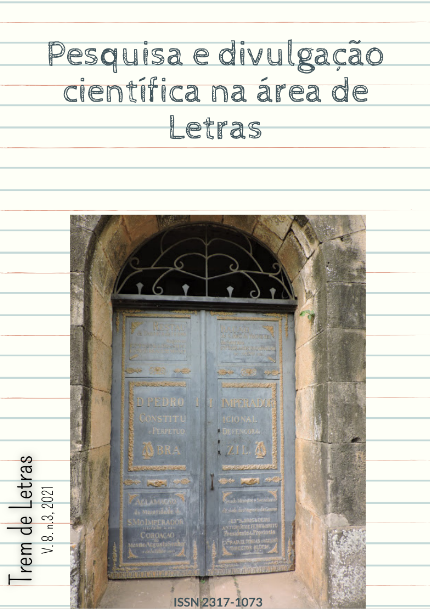Letramento Acadêmico no Ensino Superior:
da metodologia do risco ao apoio pedagógico
Keywords:
academic literacy, risk methodology, pedagogical supportAbstract
We report in this article our experiences with academic writing workshops held in the current pandemic context. In our planning, we reflected on how the process of pedagogical support to university students can be worked based on the risk methodology (MATTE, 2018), focusing on dedication, insistence and responsibility. This perspective leads us to an activity beyond what is normally directed to the teacher and, yes, to researchers, teachers, students and others interested in the themes that are developed, through the presentation of the final work in an online event, the National University Congress, EAD and Free Software (UEADSL). In addition to the risk methodology, the work is based on the ideas of Kleiman (2012) and Street (2014), on the concept of literacy, and on Fiad (2016) in relation to academic literacy studies. We adopted a similar experience at UFMG's Reading and Text Workshops when planning writing classes for the Academic Development Incentive Program (Progrida), at the Federal University of Alfenas (UNIFAL-MG). We have shown, from our observations, that this methodology can increase student engagement, favor the teaching and learning process through concrete language situations and stimulate experiences and practices within the context of the university.
References
BRASIL. Ministério da Educação. Secretaria da Educação Fundamental. Parâmetros Curriculares Nacionais: 5ª a 8ª série do Ensino Fundamental – Língua Portuguesa. Brasília: MEC/SEF, 1998.
BRASIL. Ministério da Educação. Secretaria de Educação Média e Tecnológica Semtec. PCN+ Ensino Médio: Orientações Educacionais Complementares aos Parâmetros Curriculares Nacionais - Linguagens Códigos e suas Tecnologias. Brasília: MEC/Semtec, 2002.
FIAD, R. S.. Letramentos acadêmicos: contextos, práticas e percepções. 1. ed. São Carlos: Pedro & João Editores, 2016. v. 1. 357p .
KLEIMAN, A. B.. Os significados do letramento. Uma nova perspectiva sobre a prática social da escrita. 2a.. ed. Campinas, SP: Mercado de letras, 2012. v. 1. 294p
MATTE, Ana Cristina Fricke. Sementes de Educação Aberta e Cultura Livre. Série Texto Livre: pensemeando o mundo. Tomo I. São Carlos: Pedro & João Editores, 2018.
MATTE, A. C. F.; ARAUJO, Adelma . A importância da escrita acadêmica na formação do jovem pesquisador. In: Maria Aparecida Moura. (Org.). Educação científica e cidadania: abordagens teóricas e metodológicas para a formação de pesquisadores juvenis. 1ed. Belo Horizonte: UFMG/PROEX, 2012, v. 1, p. 97-110.
SOARES, Magda. Alfabetização e letramento. São Paulo: Contexto, 2008.
STREET, Brian. What’s “new” in New Literacy Studies? Critical approaches to literacy in theory and practice. Current issues in Comparative Education, [New York], v. 5, n. 2, p. 77-91, Columbia University, 2003.
Downloads
Published
How to Cite
Issue
Section
License
1. Proposta de Política para Periódicos de Acesso Livre
Autores que publicam nesta revista concordam com os seguintes termos:
- Autores mantém os direitos autorais e concedem à revista o direito de primeira publicação, com o trabalho simultaneamente licenciado sob a Licença Creative Commons Attribution que permite o compartilhamento do trabalho com reconhecimento da autoria e publicação inicial nesta revista.
- Autores têm autorização para assumir contratos adicionais separadamente, para distribuição não-exclusiva da versão do trabalho publicada nesta revista (ex.: publicar em repositório institucional ou como capítulo de livro), com reconhecimento de autoria e publicação inicial nesta revista.
- Autores têm permissão e são estimulados a publicar e distribuir seu trabalho online (ex.: em repositórios institucionais ou na sua página pessoal) após o processo editorial, no todo ou em partes, já que isso pode gerar alterações produtivas, bem como aumentar o impacto e a citação do trabalho publicado.


